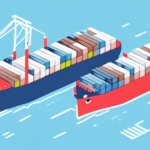Optimizing Your Supply Chain with the Right Carrier
If you're looking to optimize your supply chain, choosing the right carrier is crucial. Transportation is a vital aspect of any supply chain, and it can make or break the efficiency and profitability of your business. With the right carrier, you can improve your shipping speed, reduce your costs, and enhance your customer experience. In this article, we'll explore key factors to consider when selecting a carrier for your supply chain and provide tips for successful negotiations. We'll also examine the role of technology, analytics, and compliance in optimizing your supply chain with the right carrier.
Why Choosing the Right Carrier is Crucial for Supply Chain Optimization
Choosing the right carrier is critical for supply chain optimization because transportation can account for up to 30% of total supply chain costs, according to the American Transportation Research Institute. Moreover, the quality of your transportation service directly affects customer satisfaction, inventory management, and overall productivity. Selecting a carrier that can deliver your goods safely, quickly, and cost-effectively is essential. Mistakes in carrier selection can lead to increased costs, dissatisfied customers, and disrupted operations.
One important factor to consider when choosing a carrier is their level of experience and expertise in your industry. For example, if you are shipping perishable goods, you want a carrier with proven expertise in handling and transporting such items. Similarly, if you are shipping hazardous materials, you need a carrier that is knowledgeable about the latest regulations and safety requirements for such shipments.
Another factor is the carrier's technology and tracking capabilities. With real-time tracking and visibility, you can monitor your shipments and make adjustments as needed to ensure timely delivery. Additionally, carriers with advanced technology can provide valuable data and insights that help you optimize your supply chain and improve overall efficiency. According to a report by McKinsey & Company, companies leveraging advanced analytics and tracking technologies see a 15-20% improvement in supply chain performance.
Key Factors to Consider When Selecting a Carrier for Your Supply Chain
When selecting a carrier, several key factors should be considered:
- Type of Goods: Consider the nature of the goods you're shipping and their specific transportation requirements. For instance, perishable goods require refrigerated transport, while hazardous materials need specialized handling.
- Destination and Route: Evaluate the carrier's coverage areas. Some carriers specialize in specific geographic regions, while others offer comprehensive national or international services.
- Reputation and Safety Record: A reputable carrier has a proven track record of on-time deliveries and minimal incidents. Check their safety ratings and certifications to ensure reliability.
- Pricing and Payment Terms: Compare rates from multiple carriers and consider their pricing structures. Look for carriers offering competitive rates and flexible payment options that align with your budget and cash flow needs.
- Value-Added Services: Services such as real-time tracking, insurance coverage, and customs clearance assistance can streamline operations and reduce risks of delays or losses.
Selecting a carrier that aligns with your logistics needs can significantly enhance your supply chain's efficiency and cost-effectiveness.
Understanding the Different Types of Carriers and Their Benefits
There are several types of carriers, each with its benefits and limitations. The most common types include:
- Full Truckload (FTL) Carriers: Best suited for shipments that require the entire truck's capacity. Ideal for large, bulky shipments that need to be transported directly from the origin to the destination without stops.
- Less-Than-Truckload (LTL) Carriers: Suitable for smaller shipments that do not fill an entire truck. LTL carriers combine shipments from multiple customers, making it a cost-effective option for medium-sized deliveries. Learn more about LTL shipping.
- Parcel Carriers: Ideal for small packages and offer flexible delivery options. They are commonly used for e-commerce businesses due to their efficiency in handling numerous small shipments.
- Expedited Carriers: Specialize in time-sensitive shipments, offering faster delivery options than traditional carriers. They are essential for businesses needing to meet tight deadlines or handle urgent shipments.
When selecting a carrier, consider the type of goods you're shipping, the distance of your shipments, and your budget to determine the best fit for your needs.
It's also important to evaluate the carrier's reputation and track record. Look for carriers with a history of on-time deliveries, excellent customer service, and a low rate of lost or damaged shipments. Online reviews and industry ratings can provide valuable insights into a carrier's reliability.
Tips for Negotiating with Carriers to Get the Best Rates and Services
Negotiating with carriers can be challenging, but it's essential to secure the best rates and services for your supply chain. Here are some tips to consider:
- Provide Detailed Shipment Information: Share accurate details about your shipments, including weight, volume, destination, and delivery timelines. This information helps carriers provide precise quotes.
- Compare Multiple Carriers: Obtain quotes from several carriers to benchmark prices and services. However, don't base your decision solely on price; consider the carrier's experience, reputation, and service quality.
- Establish Long-Term Relationships: Building a long-term partnership with a carrier can lead to better rates and preferred services over time.
- Be Flexible: While it's important to secure favorable terms, be willing to compromise on less critical aspects to achieve a balanced agreement without sacrificing key priorities like safety and compliance.
Additionally, understanding the mode of transportation and the carrier's pricing structure can enhance your negotiation strategy. Some carriers offer discounts for high-volume shipments or specific services, such as expedited delivery or temperature-controlled transportation. Identifying these opportunities can help you negotiate better rates tailored to your needs.
How Technology Can Help You Choose and Manage Your Carriers
Technology plays a pivotal role in selecting and managing carriers effectively. Modern carrier selection and management software enable you to compare rates, track shipments, and identify performance issues seamlessly. By automating and streamlining your supply chain operations, you can reduce human error and enhance overall efficiency.
Key technologies that support carrier management include:
- Transportation Management Systems (TMS): These platforms help in planning, executing, and optimizing the movement of goods, offering comprehensive visibility across the supply chain.
- Electronic Data Interchange (EDI): Facilitates the seamless exchange of information between different systems, minimizing manual data entry and errors.
- Tracking and Monitoring Devices: Provide real-time data on the location and status of shipments, enabling informed decision-making and enhancing customer transparency.
Access to real-time data allows you to monitor carrier performance, adjust routes as necessary, and provide accurate delivery estimates to customers. Improved communication and collaboration through technology also strengthen relationships with carriers, fostering a more resilient and responsive supply chain.
According to a study by Forbes, companies that implement advanced supply chain technologies experience a 25% increase in operational efficiency.
Ensuring Effective Communication Between Your Transport Partners for Seamless Operations
Effective communication is essential for seamless supply chain operations. Establishing clear channels of communication with your transport partners ensures that information such as shipment details, delivery instructions, and service updates are accurately conveyed and promptly addressed.
To enhance communication:
- Use Reliable Communication Tools: Implement communication software like instant messaging, email, and phone systems to keep transport partners informed and coordinate activities efficiently.
- Establish Common Terminology: Develop a glossary of terms and definitions to ensure all parties have a mutual understanding, reducing the risk of confusion and misunderstandings.
- Regularly Review Communication Processes: Continuously assess and refine your communication channels to adapt to your business's evolving needs. Gather feedback from transport partners and customers to identify areas for improvement.
Strong communication practices help avoid mistakes, prevent delays, and maintain high levels of customer satisfaction.
The Role of Analytics in Optimizing Your Supply Chain with the Right Carrier
Analytics provide invaluable insights into carrier performance, shipment patterns, and logistics costs, enabling you to optimize your supply chain effectively. Advanced analytics software can identify areas for improvement and refine your carrier selection and management strategies, driving better decision-making.
Key benefits of using analytics in supply chain management include:
- Performance Tracking: Monitor metrics such as delivery times, transit durations, and shipment accuracy to evaluate carrier performance and identify top-performing partners.
- Cost Analysis: Analyze logistics costs to find opportunities for cost savings and improved budgeting.
- Predictive Insights: Utilize predictive analytics to forecast demand, optimize inventory levels, and anticipate potential disruptions.
By leveraging data-driven insights, you can minimize risks, enhance carrier relationships, and maximize the efficiency of your supply chain strategy.
A report by Supply Chain Digital highlights that companies using analytics in their supply chain operations see a significant reduction in logistics costs and an improvement in service levels.
The Importance of Compliance and Safety in Carrier Selection for Your Supply Chain
Compliance and safety are paramount when selecting a carrier for your supply chain. Ensuring that your carriers adhere to local, national, and international regulations governing transportation is essential for minimizing liability and avoiding operational disruptions.
Key compliance considerations include:
- Regulatory Adherence: Ensure carriers comply with all relevant transportation laws, including safety standards, environmental regulations, and labor practices.
- Safety Records: Review carriers' safety records and certifications to assess their commitment to secure and responsible transportation.
- Insurance Coverage: Verify that carriers provide adequate insurance to cover potential damages or losses during transit.
Non-compliance can result in severe consequences, including legal liabilities, damage to your reputation, and operational setbacks. Partnering with carriers that prioritize compliance and safety safeguards your business and maintains trust with your customers.
For more information on transportation compliance, refer to the U.S. Department of Transportation’s Safety Website.
Real-World Examples of Successful Supply Chain Optimization with the Right Carrier
Several companies have successfully optimized their supply chains by selecting the right carriers:
- Cost Reduction: A manufacturing company switched from Full Truckload (FTL) to Less-Than-Truckload (LTL) carriers, resulting in a 20% reduction in transportation costs and improved delivery times.
- Enhanced Carrier Performance: An e-commerce business implemented advanced tracking technology to monitor carrier performance, identifying inefficiencies that led to a 15% improvement in on-time deliveries.
- Operational Efficiency: A retail chain partnered with a reputable third-party logistics provider, which managed their transportation needs and reduced operational costs by 25%, while streamlining administrative processes.
These examples demonstrate that optimizing your supply chain with the right carrier can lead to significant financial and operational benefits, ultimately enhancing your business's competitiveness and customer satisfaction.
Conclusion
Optimizing your supply chain with the right carrier is essential for improving efficiency, reducing costs, and enhancing customer experience. To achieve this, you must:
- Select a carrier that aligns with your specific logistics needs and industry requirements.
- Negotiate effectively to secure favorable rates and terms without compromising on quality.
- Leverage technology to manage and monitor your transportation operations efficiently.
- Ensure that your carriers adhere to compliance and safety standards to mitigate risks.
Remember, optimizing your supply chain is an ongoing process that requires continuous attention, data analysis, and improvement. By prioritizing these strategies, you can build a resilient and efficient supply chain that drives your business forward and exceeds your customers' expectations.






















